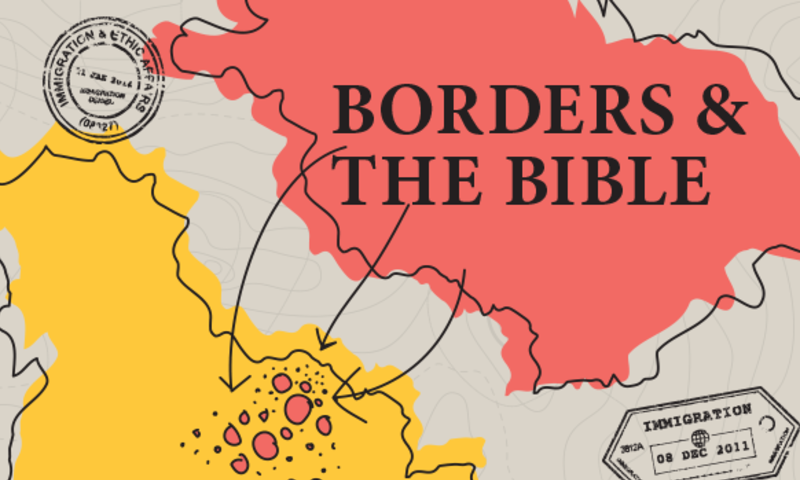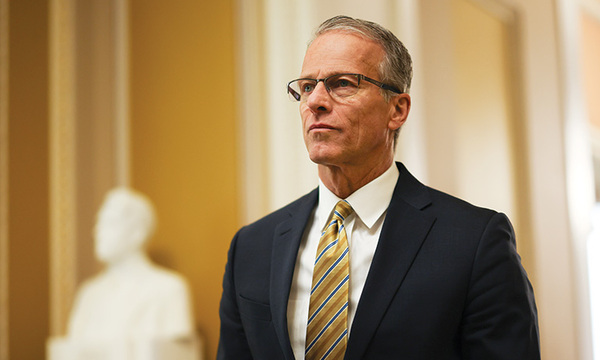For Nohemi, a senior communications studies major at Biola, immigration is more than just a topic of debate. ItŌĆÖs real life. NohemiŌĆÖs mom was eight months pregnant with her when she decided to cross the border from Mexico. Wanting the best life for her daughter, she had applied for a visa to enter the United States legally. But it didnŌĆÖt arrive in time. She crossed the border in a tunnel, but a police officer stopped her soon after she crossed into the U.S. At that very moment, her water broke. Having sympathy on her predicament, the police officer let her go to a hospital. And Nohemi was born in the U.S.
ŌĆ£I always think about that story because itŌĆÖs changed my life,ŌĆØ said Nohemi, whose family established a life in East Los Angeles. And though she and her younger sisters were born in the U.S. and are legal citizens, her parents remain undocumented.
ŌĆ£The fear is there all the time,ŌĆØ said Nohemi, who remembers a time in the car when her dad was driving and got stopped by a police officer. ŌĆ£My mom started sobbing,ŌĆØ she remembers, but the officer was gracious and just said, ŌĆ£Be careful next time.ŌĆØ
The fear in her family and her community is heightened in the current political climate, with the possibility of U.S. Immigration and Customs Enforcement raids a constant concern.
ŌĆ£I remember the night President Trump got elected,ŌĆØ said Nohemi. ŌĆ£My mom came into my room and said, ŌĆśIf anything happens to your dad and me, please take care of your sisters.ŌĆÖŌĆØ
Nohemi knows her parents have sacrificed a lot by living where they live. When her momŌĆÖs father and dadŌĆÖs brother died back in Mexico, her parents could not go back for the funerals. Nohemi remembers her mom crying ŌĆ£all the timeŌĆØ because she could not say goodbye before her father died.
But because of her parentsŌĆÖ decision, Nohemi is able to study at a place like ║┌┴Ž└·╩Ę, where she is preparing for a career in human resources and working hard to make the most of her opportunity.
ŌĆ£I know that the only reason my parents are here is for me,ŌĆØ she said. ŌĆ£Failure is not an option.ŌĆØ
Questions about border security and immigration policies were front and center in the 2016 U.S. elections, as they have been in many European elections in recent years. Fear, anger and emotions of all kinds run deep and wide on this topic. But as NohemiŌĆÖs story illustrates, the issue concerns real lives, even within the Biola community.
How do we respond to the human dynamics of immigration in a way that is faithful to Scripture? Unfortunately, Scripture is not currently informing how most Christians think about immigration. A 2015 LifeWay Research survey asked evangelicals to name the factor that most influenced their beliefs about immigration. Only one in 10 chose the Bible. Meanwhile, 16 percent said their views were most influenced by the media.
This should prompt us to ask: How might we think biblically about immigration more than we think politically about it?
What Does the Bible Say? Key Themes For the Immigration Discussion
To think biblically about complex and contested topics, we must not look just to a handful of verses to justify our entrenched political views, but rather to the whole of ScriptureŌĆÖs witness. The following, then, is a non-exhaustive survey of key biblical themes to consider as we engage the immigration discussion.
Imago Dei
In his 2008 book, Christians at the Border, Old Testament scholar M. Daniel Carroll R. says, ŌĆ£The creation of all persons in the image of God must be the most basic conviction for Christians as they approach the challenges of immigration today. Immigration should not be argued in the abstract, because it is fundamentally about immigrants. Immigrants are humans, and as such they are made in GodŌĆÖs image.ŌĆØ As a starting point that takes us back to Genesis 1:26ŌĆō27, then, the imago dei is an essential biblical principle to apply to the immigration debate ŌĆö a debate not just about facts and figures, but of people who bear GodŌĆÖs image.
Migration is Central to the History of GodŌĆÖs People
Migration is an unmistakable theme in the Old TestamentŌĆÖs history of GodŌĆÖs people. The Old Testament patriarchs are often described as sojourners: Abram (Gen. 11:31ŌĆō12:20), Isaac (Gen. 35:27, 37:1) and Jacob (Gen. 28:4). There are also moments when GodŌĆÖs people relocate to flee danger, like todayŌĆÖs refugees. Moses flees to Midian (Exod. 2:11ŌĆō22) and David flees to Moab (1 Sam. 22:3ŌĆō4), for example. And then there are moments when GodŌĆÖs people live as forced exiles or oppressed minorities in foreign lands: Joseph and the Israelites in Egypt, the exiles in Assyria, Daniel in Babylon and so on. The entire book of Ruth might be read as an immigrant story too.
In an October 2016 lecture on ŌĆ£The Hebrew Bible and Migration,ŌĆØ Markus Zehnder, professor of Old Testament and Semitics at BiolaŌĆÖs Talbot School of Theology, said ŌĆ£experiences of migration deeply characterize the history both of the patriarchs and of the people of Israel.ŌĆØ And yet Zehnder ŌĆö himself a migrant who has only recently arrived in the U.S. with a nonpermanent visa, after having lived in various places in Europe and Asia ŌĆö cautioned that we not overlook the fact that in the Bible, migration is always ŌĆ£an intermediary step, and not the end goal.ŌĆØ
Jesus Was an Immigrant
Migration and sojourning are also unmissable themes of the New Testament, starting with Jesus himself. In thinking about migrants and refugees, we mustnŌĆÖt overlook the fact that Jesus lived this experience. He and his family fled to Egypt to save their lives. Jesus was a refugee. But he was also an immigrant in his own land, something Octavio Esqueda, professor of Christian higher education at Talbot School of Theology, pointed out in a recent blog post (ŌĆ£Jesus, the ImmigrantŌĆØ) for TalbotŌĆÖs faculty blog: ŌĆ£[Jesus] was from Nazareth and when he ministered in Judah he suffered discrimination from his own countrymen.ŌĆØ
We can also think about Jesus as identifying with the sojourner in his very incarnation.
ŌĆ£Christ emigrated to earth to live among human beings,ŌĆØ wrote Esqueda, who grew up in Mexico but has lived in the U.S. for 19 years, and is now a citizen. ŌĆ£We could suppose that his visit was received with joy, but sadly the apostle John declares, ŌĆśHe was in the world, and the world was made through him, and the world did not know him. He came to his own, and those who were his own did not receive himŌĆÖ (John 1:10ŌĆō11).ŌĆØ
Christians Are Immigrants
Throughout the New Testament, the people of God are described as sojourners and exiles on earth, whose true citizenship is in heaven. Take Ephesians 2:19 (ŌĆ£you are no longer strangers and aliens, but you are fellow citizens with the saints and members of the household of GodŌĆØ), Philippians 3:20 (ŌĆ£our citizenship is in heaven ...ŌĆØ), 1 Peter 2:11 (ŌĆ£aliens and strangersŌĆØ) or Hebrews 11:13 (ŌĆ£strangers and exiles on the earthŌĆØ). This should lead Christians to empathize with sojourners and have a proper perspective on kingdom citizenship as a higher allegiance than national citizenship.
Monica Cure, assistant professor in BiolaŌĆÖs Torrey Honors Institute, knows what itŌĆÖs like to be a refugee. Born in Romania, she fled to America with her family in 1982, escaping the communist regime. Though she believes itŌĆÖs important that Christians positively contribute to the societies they are in, shining light before others as in Matthew 5:16, ultimately they must remember that ŌĆ£weŌĆÖre all sojourners on this earth,ŌĆØ she said. ŌĆ£When we get so attached to a national identity, I donŌĆÖt think thatŌĆÖs what Christ intends.ŌĆØ
Diversity is Not a Deficiency
When we consider the diversity of ethnic groups in the world, we should recognize that the Bible sees this as something positive, ŌĆ£not as a deficiency that has to be overcome by human endeavors to create faceless uniformity,ŌĆØ Zehnder said. ŌĆ£GodŌĆÖs creativity is visible in the fact that there are many different ethnic groups and nations, and not just one,ŌĆØ something we can see from the connection between the blessing of humanity in Genesis 1:28, of Noah and his sons in Genesis 9:1, and the list of nations in Genesis 10. The ŌĆ£countermodelŌĆØ for this, said Zehnder, is the story of Babel (Genesis 11), ŌĆ£where humans try to establish a centralized form of society where all these differences are erased.ŌĆØ But this is rejected by God. Furthermore, Zehnder points out that there will be a variety of different ethnic groups and nations in the eschatological future (e.g. Rev. 7:9). According to the Bible, it is not the case ŌĆ£that the differences between ethnic groups are just for now, but that in eternity it will be different,ŌĆØ said Zehnder. ŌĆ£Uniformity is not the picture that we get in the Old or the New Testament.ŌĆØ The biblical view is that GodŌĆÖs blessing results in a diversity of ethnicities and nations, not a global melting pot.
Christianity Transcends Borders
One of the most distinct things about Christianity is that it creates a new people made up of every tribe and tongue and nation. This is an aspect that made Christianity attractive to Tania Abouezzeddine, assistant professor of psychology in BiolaŌĆÖs Rosemead School of Psychology. Ethnically Lebanese and raised in the Middle East, Abouezzeddine came to Christ at age 22, after being raised in an ethnically Druze but agnostic home.
ŌĆ£I was drawn into the Christian faith because it appeared there was a God who loved no matter the ethnicity or background, that the gospel is for everyone,ŌĆØ Abouezzeddine said. ŌĆ£ItŌĆÖs beautiful that the beginning of the book of Acts is a very global picture. The gospel is heard in every tongue and language. These people groups hear the gospel and the invitation is for them.ŌĆØ
The global picture of GodŌĆÖs kingdom does not eliminate the existence and the goodness of nations and ethnicities, but it does reinforce that there is one church, said Esqueda.
ŌĆ£The members come from different cultures and contexts, but there is only one church. One bride,ŌĆØ he said. ŌĆ£There is not the church in Mexico and the church in the United States. There is just the church, and we need to speak with one voice about what God values.ŌĆØ
Borders ArenŌĆÖt Inherently Bad
The fact that Christianity transcends borders does not mean borders are bad things. In Deuteronomy 32:8, repeated almost verbatim in Acts 17:26, we see that God himself established boundaries, making distinctions between different groups of people.
ŌĆ£Nations are really extended families,ŌĆØ said Zehnder, noting that the Bible references nations using the Hebrew term for family. Families and nations are good, creational things that are ŌĆ£psychologically healthyŌĆØ for us, he added. We shouldnŌĆÖt worship or idolize our nation or our family, but ŌĆ£we need to see nationhood as the Bible sees it, as an extended family.ŌĆØ
Darren Guerra, associate professor of political science at Biola, agrees. A borderless world, he said, ŌĆ£destroys the very notion of community on any human scale. The Bible affirms nations and families and communities, while still putting limits on where our true allegiance should lie.ŌĆØ
Guerra believes the erosion of distinct nations, much like the breakdown of the family, can wreak havoc on overall human flourishing.
ŌĆ£Who will administer the laws in this increasingly borderless world where national identity and national sovereignty is an afterthought?ŌĆØ he asked. ŌĆ£Human history suggests it will degenerate into the rule of those who believe that ŌĆśmight makes right.ŌĆÖŌĆØ
Hospitality Toward the Foreigner
The Old Testament is replete with admonitions to Israel to be welcoming and hospitable to foreigners. GodŌĆÖs people are not to wrong or oppress foreigners, because they were once foreigners in Egypt (Exod. 22:21ŌĆō23, 23:9). Or take Leviticus 19:33ŌĆō34: ŌĆ£When a stranger sojourns with you in your land, you shall not do him wrong; You shall treat the stranger who sojourns with you as the native among you, and you shall love him as yourself, for you were strangers in the land of Egypt.ŌĆØ
But just as there are demands on Israel regarding the foreigner, there are clear expectations on the sojourners too. The phrase ŌĆ£whether he is a sojourner or a native of the landŌĆØ is included in many Old Testament regulations, for example (Exod. 12:19; Lev. 18:26, 24:22; Num. 15:30, 19:10). And itŌĆÖs important to recognize that there are two types of migrants in the Old Testament. The ger (e.g. Exod. 22:21ŌĆō23, 23:9; Deut. 10:17ŌĆō19; Deut. 24:14ŌĆō15, Lev. 19:55, 33ŌĆō34) is a type of migrant who comes to stay in Israel, perhaps because of war or famine. The ger is given special rights and is expected to assimilate. The nokri, on the other hand, is a type of migrant who does not assimilate into Israelite life. The nokri is viewed with a bit more suspicion in the Bible (e.g. Ps. 144:7ŌĆō11) and is prevented from participating in some of IsraelŌĆÖs rituals (e.g. Exod. 12:43; Ezek. 44:7). According to the ancient Israelite system, you can choose to come as a nokri, ŌĆ£but you donŌĆÖt get all the protective rights that we have in the laws,ŌĆØ Zehnder said.
Respecting the Law
Romans 13 (ŌĆ£Let every person be subject to the governing authorities ...ŌĆØ) is an important text for Christians as we think biblically about immigration. ItŌĆÖs important because much of the debate concerns questions of legality and the rules set out by governing authorities. And this applies both to undocumented immigrants and to the employers who hire them illegally for cheap labor. But as important as this text is, ŌĆ£You donŌĆÖt start any theology with Romans 13,ŌĆØ Esqueda said. ŌĆ£You start with Genesis. We must have the big picture in mind.ŌĆØ
Submitting to authorities does not necessarily mean agreeing with everything a government does, and sometimes the higher authority of Christ will call a Christian to oppose and work to change the laws of human authorities, where they are broken or unjust (for example, abortion laws today, or slavery in the 19th century).
ŌĆ£We can try to reform the law without breaking the law,ŌĆØ said Esqueda, who believes Christians should still care for their immigrant neighbors regardless of their legal status, because Christ puts no qualifiers on his command to love, and ŌĆ£helping people is not breaking the law.ŌĆØ
The Love Commands of Jesus
Jesus talked a lot about loving others. ŌĆ£You shall love your neighbor as yourselfŌĆØ (Matt. 22:39). ŌĆ£Love your enemiesŌĆØ (Matt. 5:44). ŌĆ£Love one another as I have loved youŌĆØ (John 15:12). In Matthew 25 Jesus describes the final judgment in terms of those who did or did not have compassion on ŌĆ£the least of theseŌĆØ (ŌĆ£For I was hungry and you gave me food, I was thirsty and you gave me drink, I was a stranger and you welcomed me, I was naked and you clothed me, I was sick and you visited me, I was in prison and you came to meŌĆØ (vs. 35ŌĆō36).
Jesus also challenges our narrow definitions of ŌĆ£neighbor,ŌĆØ such as in the Parable of the Good Samaritan (Luke 10:25ŌĆō37). He lived out this ethic in his own life, by dining with the lowly and dignifying the outcast. His paradigm of love was defined by the sacrifice of the cross: ŌĆ£Greater love has no one than this, that someone lay down his life for his friendsŌĆØ (John 15:13). The love he preached was radical, costly and inconvenient. How does this inform the way we think about immigration?
Loving our Neighbor in the Immigration Debate
The crux of the immigration debate for many Christians is the question of how best we love our neighbors. And there are a variety of approaches to this question, even at a place like Biola.
Thomas M. Crisp, a philosophy professor at Biola, examined this question in a talk at the ║┌┴Ž└·╩Ę Center for Christian ThoughtŌĆÖs Table Conference in 2016. He said loving your neighbor as yourself means: ŌĆ£Moved by appreciation of your neighborŌĆÖs (anyone in need and in reach of your care) enormous worth as an image bearer of God, seek her shalom ŌĆö her sustenance, security, dignity ŌĆö putting pursuit of these things for her on a par with pursuit of them for yourself.ŌĆØ
Crisp argued that current U.S. immigration policies inflict great harm on immigrants (detention, deportation, family separation, hunger, homelessness, PTSD), and that this should put pressure on those committed to following Jesus and his love teachings to stop supporting and work against these practices.
ŌĆ£Infliction of violent harm on people ŌĆö who seek merely to meet their sustenance needs by honest work ŌĆö in order to protect our own economic interests, is a textbook case of our not putting these neighborsŌĆÖ shalom on par with our own,ŌĆØ Crisp said. ŌĆ£To treat them thus is to fail to love them as we love ourselves. ItŌĆÖs to wrong them.ŌĆØ
But other professors at Biola have different interpretations of how ŌĆ£love your neighbor as yourselfŌĆØ should apply to immigration.
ŌĆ£What if multiple neighbors are impacted differently by our preferred policy?ŌĆØ Guerra asked. ŌĆ£Which neighbor do we privilege over another? To what extent can we coerce others to serve our neighbor? How do we balance the needs and duties to our own family in this context? Do we have duties to our neighbors on a personal level that are different than our duty to enact sound policies for the larger community? What policies might best sustain a political order that respects the imago dei of all members of the community?ŌĆØ
Guerra believes part of loving our neighbor well is recognizing the need for communities to maintain legal order that provides peace, safety, stability and conditions for human flourishing.
ŌĆ£There is nothing intrinsically unloving about seeking the good of the entire community,ŌĆØ he said. ŌĆ£That good might point to some limits and rules. Limits and rules that, to be sure, must be administered in as loving a manner as possible.ŌĆØ
Professor Zehnder said sending undocumented immigrants back to their home country, unless in the case that they are being sent back to ŌĆ£sure death,ŌĆØ is not necessarily a failure to love the neighbor.
ŌĆ£We must look at the whole picture,ŌĆØ he said. ŌĆ£Sending a person back to where they come from because they are illegal is just an act of justice. They treated others unfairly, those who tried to come legally.ŌĆØ
Zehnder believes it is unwise to let one single aspect govern the question.
ŌĆ£We have to keep the benefit of most people in view,ŌĆØ he said, suggesting that a better strategy than taking in more immigrants would be to send aid and seek to alleviate problems in the sending country. The amount of money spent to help one person in the U.S. will help at least 70 persons in their countries of origin, he said.
ŌĆ£As Christians we should try to help these people where they live. Importing them here will not solve the problem. It changes the U.S. and creates a lot of extra problems here, but it doesnŌĆÖt really change anything in the sending country.ŌĆØ
Professor Esqueda believes the love commands are unequivocal, but he agrees that their implications for immigration are not as simple as disregarding laws and opening borders.
ŌĆ£The Bible says because God loves us, we receive his discipline,ŌĆØ he said. ŌĆ£Love doesnŌĆÖt mean ŌĆśdo whatever you want.ŌĆÖŌĆØ
Immigration and Christian Mission
Mission is another important factor to consider as we think biblically about immigration. How does our posture on immigration, as Christians, help or hinder the advance of the gospel? Does the influx of immigrants from Mexico, or the Middle East, or anywhere else, present hindrances or opportunities to the American church? Some would say itŌĆÖs a missional opportunity, God bringing the harvest to our front door. And as the center of gravity in global Christianity continues to move away from North America and Western Europe to the Global South, itŌĆÖs just as likely that the immigrants coming here will be missionaries to us.
Professor Abouezzeddine fears that the current political rhetoric about immigration, often associated with evangelical Christianity, will be a stumbling block to people in certain ethnic groups who might otherwise be open to Jesus.
ŌĆ£I think the current rhetoric is building walls in places God doesnŌĆÖt want to build walls,ŌĆØ she said. ŌĆ£We should not be instruments of stumbling for those who need to hear about GodŌĆÖs love and sacrifice for them.ŌĆØ
Abouezzeddine thinks itŌĆÖs arrogant to assume we can go, as missionaries, to foreign countries and expect a hospitable welcome, and listening ears, if we have not reciprocated that.
ŌĆ£If I know that you disrespect me, I am unlikely to listen to you,ŌĆØ she said. ŌĆ£The bridge of communication is opened with mutual respect. It doesnŌĆÖt mean you have to agree with everything I think, but if thereŌĆÖs no respect, why would I listen to you?ŌĆØ
Jon Garcia (ŌĆÖ11, M.A. ŌĆÖ14, M.A. ŌĆÖ16), a Biola and Talbot alumnus who now works in graduate admissions at Biola, sees the missional aspect of this conversation as a missed opportunity for the church.
ŌĆ£Immigration reform is a missional and evangelistic opportunity, but itŌĆÖs one that weŌĆÖre throwing away by communicating that we donŌĆÖt care about immigrants,ŌĆØ said Garcia, who is part of the preaching team at a local Spanish church. ŌĆ£This is a huge opportunity to love people nobody else wants to love.ŌĆØ
Garcia notes that there are many undocumented Christians in our communities who, if we really believe that the church is a family, we should treat as our brothers and sisters.
ŌĆ£Even if that means it will be scary or will affect our pocketbooks, we are called to love them well,ŌĆØ he said. ŌĆ£These are good moms, good dads, good kids who just were not born with the same privilege that some of us were born with.ŌĆØ
One practical way Christians and churches can help is by volunteering with refugee resettlement agencies, helping newly arrived refugees with the daunting challenges of adjusting to a new home. Professor Cure and a group from her Los Angeles church volunteered last year to adopt a family of refugees and help them resettle.
ŌĆ£We helped them find an apartment,ŌĆØ she said. ŌĆ£We drove them everywhere: a family of seven, so it always took two cars! We took them to doctorŌĆÖs appointments. One of the children had a heart condition that had been identified when they were in the refugee camp in Turkey. We started teaching them English, where to buy food, how to ride the bus, where to buy stamps for letters.ŌĆØ
Cure said the experience reminded her not only how much we take for granted as we navigate our lives, but how the refugee is really not that much different than any of us.
ŌĆ£This could be anybody. This could be your family. Any one of us could be in the situation that these refugee families are in.ŌĆØ
WeŌĆÖre All Temporary Residents
As we ŌĆö Christians, churches, Biola ŌĆö think biblically about this topic, we should not oversimplify the issues, but neither should we throw up our hands in the face of their complexity.
We should be informed and educated about the issues involved, as well as engaged on the political level if we are citizens. But we should embrace the complexity of immigration without letting it hinder us from the myriad of personal, practical, everyday things we can do to love our immigrant neighbors, as we are called to love all our neighbors.
As Esqueda said, ŌĆ£Helping people is not breaking the law.ŌĆØ We can be friends to sojourners in our foreign land. Why? Because Jesus was first a friend to us, and because we know what itŌĆÖs like to be sojourners: strangers and exiles on this earth, temporary residents in a world that will be no oneŌĆÖs permanent home.
 ║┌┴Ž└·╩Ę
║┌┴Ž└·╩Ę




